- Home
- Tim Winton
That Eye the Sky Page 2
That Eye the Sky Read online
Page 2
All of a sudden Mum is at the sink doing absolutely nothing at all except having her shoulders jump up and down.
‘I remember,’ I say to her.
‘Your father’ll remember too. When it’s all over, he’ll remember.’
I don’t sleep that good. Never have. Even when I was little and Mum or Dad put me to bed, I’d lie awake until they’d gone to bed themselves – longer even. It’s lonely in the middle of the night with just you and the sky and the noises of the forest. There’s no one to talk to except that big sky. Sometimes I talk to it. Sounds funny, but I do. Ever since they brought me home from the hospital the time I was so sick, I haven’t slept good. It’s like those two weeks of sleeping in the coma were enough sleep for one person in their life. Strange to think that Dad’s down there in a hospital in the city asleep, hearing all those voices and seeing all those colours like I did. He won’t sleep much good when he gets better, that’s for sure. Still, he’s not much of a sleeper anyway.
I can hear Tegwyn talking in her sleep. All night she was playing Grammar’s piano. She hammers up and down on it with her brown plaits hanging down forward, her long fingers going at it like mad, her back bent like a slave. She bashes that piano, Tegwyn. I don’t know about her. Sometimes I see her in the shower through the hole in the asbestos. She sings to herself. She’s got big boobs – they look like pigmelons – bigger than Mum’s. Mum’s are like two socks full of sand. Tegwyn isn’t happy much. When she’s in the shower she soaps her legs and in between like she’s trying to hurt herself. She looks at her soapy brown legs with a sad look. And sometimes she looks straight into the shoot of water that comes out of the shower head. She lets it go right into her eyes. For a minute, sometimes, looking straight into it and letting it hurt her. I don’t think she feels it until she goes to sleep. That’s why she groans and calls out in her sleep. Those noises make me cry for no reason, sometimes. Night time is like that. Crazy things happen and you just can’t help it.
I was born at night. In this house – out in the livingroom. Mum and Dad talk about it now and then. It was winter and cold. Dad said he could hear a dog barking somewhere all night. Mum was all fat with me inside and in those days there wasn’t any ute. The people who owned Cherry’s Roadhouse in those days had a car, but they were out seeing people in Bankside. Mum started to hurt with me, and Dad put her in the livingroom where the fire was going hot and red. All the time he was looking through the curtains across to the roadhouse to see if the people had come back with their car. There was no phone. Still isn’t – Mum and Dad don’t like them. It was a long drive into town and the hospital. Dad was starting to get jumpy. Mum said he kept stoking the fire up for something to do until the room got so hot that the wallpaper started to come off. Then Dad was running around trying to put the wallpaper back up and while he was doing that Mum had me on the sofa and the first thing I must’ve saw was those lousy brown flowers on the sofa and my Dad chucking a mental.
Mum said I came out all blue with that cord thing all round me neck. She bit it. Ugh! And pretty soon I went all pink and she gave me some milk from her boobs which probably weren’t so socky in those days. Well that’s what Tegwyn says.
I’ve always lived in this house – even from the first day. Maybe that’s why I like it so much. Tegwyn was born in hospital. I know enough about hospitals to tell you that you don’t want to be born in one.
Mum was born in a truck coming across the Nullarbor Plain. She just got shook out. The Nullarbor has the worst roads in the world. Dad got born on the enquiries desk of a police station. He says they just cut his cord and put him in the OUT basket. Grammar used to talk about it once. I think she was born on a farm up north where all the ground is red and it rains in summer and is warm in winter.
Being born is hard work. Mum says people scream. Errol came out tapping. His egg just opened up and there was no screaming, but I suppose it was hard work all the same.
People die, too. Even stars die – you see them falling out of the sky. Mum used to say it was the sky shedding a tear.
Tegwyn is asleep now. Everything is asleep.
Before I go to sleep, I go out and pee off the back verandah. The ground smells summery. That stupid rooster is at it. Middle of the night. A long time after I’m dried up, I stand out there looking up to see if maybe a star might fall.
Chapter Three
THE SUMMER HOLIDAYS came so quick – here they are. I’m in them! And here I am with Fat, walking along the top bank of the creek down towards the sawmill with everything jumping in the trees, and the pods snapping and popping in the heat. I’ve got one eye out for snakes and the other out for something different. Down here, you always find something different. Holidays do that to you, you know. You see better, you smell better.
In the reeds along the edge of the creek, frogs churk and gulp and catch flies. The water is still and brown. By the end of summer there’ll probably be no water at all and there’ll be roos and rabbits sniffing out pools all along here at dusk. Tadpoles scribble away across the surface. Birds tip-toe here and there like old ladies. There’s tigersnakes about, but you just don’t think about that.
‘Can you see it?’ I ask Fat. His shirt is off and his bellybutton is full of flies. Fat squints. When he moves, his bellybutton squints too, but those flies won’t move for anything.
‘Nup.’
‘Should be along here somewhere. Was ’ere in winter. ’Member that time you nearly drowned us?’
‘That was your fault.’
‘Ah, pull the other one.’ Fat capsized us. I can’t say anything. He knows he’s fat – he doesn’t need me to tell him.
‘There,’ Fat says, ‘there it is.’
We run along for a bit and then edge down the bank on our bums to where we can see the brown corner of that car roof we had last summer.
‘It’s pretty rusty,’ I say. We try to pull it out. Grass and pigface have grown all over it and it’s half-buried in mud. There’s even roo poop on it. But there’s no holes in it, and pretty soon we’ve got some long sticks for poles and we’re out on the water. The creek is only six foot wide or so, but it’s deep in places. After pushing away and making a lot of noise – what with shouting at Fat to keep in the middle, and nearly losing my pole – we get going smooth and quiet and the only noise is the water moving aside to let us pass and the mosquitoes playing their sirens all around.
When it’s like this, and you’re doing something quiet with someone, like when Dad and me are walking through the forest, or when Mum and me have stopped reading a book together ’cause it’s started to rain all of a sudden, it’s then that you feel like you know what both of you are thinking and you don’t have to talk. Fat’s back is pink already from the sun. I can hear him breathing. He hasn’t been over for a while. We’ve done some things, me and Fat.
‘Mum an’ Dad had a fight las’ night.’
I look up from the water. He talked.
‘Yeah?’
‘Mum kep’ hittin’ ’im with the Sunday Times.’
I laugh. The Sunday Times is what Dad used to hit his dog with, before the dog got caught in a rabbit trap and had to be put down.
‘He was . . . cryin’.’
‘Oh.’
Fat steers us away from the end of a log all clotted with ants. I don’t say anything.
‘Like a baby.’
We keep poling quietly down the creek until we get to the sawmill.
For a long time they cut the forest up at the sawmill. Down around Bankside you can see stumps everywhere, little grey toadstools. All the farms in the district used to be forest. Now the forest is only this small bit behind our place and along the main road for a mile or so. It goes down to the edge of the scarp – another mile – and that’s all. And now there’s dieback eating them all to death. My Dad talks about it a lot. He loves trees. He had a fight with a logger once, but that was a long way before my time and Mum reckons it’s not true anyway. The sawmill hasn’t been used since I
’ve been alive – that’s twelve years. We pull up near it, and shimmy up the bank.
Fat and me kind of stand around, picking through things, but our hearts aren’t in it. I climb into what’s left of the old furnace and shout. My word jumps back at me and goes across and up in an echo: You! You!
You!
Everything is rusty and when you touch it it falls apart or makes your hands red. The sheds are all falling over. Some saws are still left, but you couldn’t move ’em with an earthquake. There’s big wheels and cogs and pistons, but nothing fits together anymore. Possums live up under the roof. They must get used to the flapping tin. It wasn’t such a good idea to come here. Everything is too sad.
‘Why were they fighting?’ I ask Fat as we push further downstream. Flies and mozzies divebomb us. Something crunches off into the bush. ‘Your Mum and Dad.’
Fat doesn’t say a word. He hardly moves. Maybe he’s trying hard to keep balance. His pink legs come out either side of him like wings.
We float on down, pushing ourselves over logs with our poles bleeding sap where we broke them off.
He doesn’t say a thing.
Where the creek meets the main road, there is a wooden bridge with white rails and big black piles driven into the bank at either side. Sometimes Fat and me like to lie under there in the cool with all the insects singing and listen to the cars going across, setting all the boards going like a xylophone. There’s a high note at one end, and a low one at the other. Cars come up the scales or down them. Tegwyn says it’s not real scales at all and we’re jus’ kids. Fat usually makes a fart with a hand under his arm and that makes her go away. ‘I’m so disgusted,’ he’ll say, walking after her the way she walks with her bum going from side to side.
As we get far enough around the bend to see along the high banks, Fat says:
‘There’s someone under there.’
‘Who?’
‘How do I know?’
‘Let’s get out and go over, see who it is.’
‘No,’ Fat whispers, ‘it’s quieter on the water. Let’s float down closer. They won’t see us if we keep to the bank.’ He’s right, you know. He’s not dumb, Fat.
From behind a fallen log, we watch the person under the bridge. I can hear Fat’s heart. Small birds wink past. It’s a man. Older than my Dad. His pants are grey and baggy. He’s on his knees with his hands in his lap and his head is all back so that his black hat kind of hangs off and looks like it’ll fall any moment. Sometimes he looks like he’s talking because his mouth moves. Beside him is a blanket and a little brown bag. Fat looks at me and I look at Fat.
A car, a station wagon, rushes over and sets the bridge xylophoning up the scale but the man on his knees under the bridge doesn’t seem to hear.
‘He’s been sleepin’ here,’ Fat says, very quiet. We’re close enough to hit him with a stone, an easy underarm throw. His face is brown and looks like the old saddle Dad has out in the shed – all cracks and lines that change when his lips move. His teeth are very white. His hands are big in his lap. He looks clean enough. Suddenly he reaches behind and pulls up a head of grass and squeezes it in his hands until all the soil falls away, then he just holds it to his face and his lips keep moving.
We sit here for a while, hardly breathing, not taking our eyes off him for a minute.
The sun is almost down by the time we get over to Fat’s place, and in the driveway of the roadhouse there is a man in a Ford flat-top with the horn going on and off and his face all red above a shirt and tie that are both undone as if he’s been tearing at them he’s so angry.
‘How the bloody hell does a man get some service around this godforsaken place?’ he’s yelling between honks.
‘How much do you want?’ Fat says, his eyes going thin very quick. He pulls the nozzle off the bowser and takes it over to the Ford. ‘Your petrol cap’s locked.’
‘Leave it alone, Slim. I want your father.’
‘You won’t fit him in there,’ Fat says, pointing to the petrol tank.
The red man with the pulled tie and open shirt says to me: ‘You think that’s funny?’ His eyes are white on his face. He looks like he might open the door and climb down any moment.
‘No, sir,’ I mumble.
‘How much do you want?’ Fat asks again. He looks like nothing could make him laugh. But his belly gives him away; I can see it just beginning to shuffle around.
The man puts his sunglasses on and looks like he’s going to do something any moment. Then he’s leaning forward a little – going for the door handle. No, he’s winding the window up. The bowser rumbles. Fat points the nozzle onto the truck’s tray. With a sharp kick the Ford starts up. The man looks at me for a second and then he drives off with a squeal. I can’t believe it. And there’s petrol pouring off the tray as he swings out onto the road and heads down towards the city. Pouring off. Like the back of a council water truck.
I turn to Fat. He’s got this cheesy grin all over him and there’s still drips of petrol running down the steel tip of the nozzle. ‘Fat!’
And then we’re both laughing our teeth out.
For a while we fossick about in the workshop, once or twice putting the hydraulic lift up for a dare. There’s a calendar on the back wall from 1969. That was the year after Tegwyn was born. On the calendar there’s a girl with big brown boobs and a dumb look. Pirelli. Pirelli is tyres. All over the floor there’s tools and parts and gobs of oil and bits of rag. This is where my Dad works. Sometimes I come in here and see his bum sticking out of the bonnet of someone’s car. The radio always plays and there’s revving and the chink of spanners. Y’canna hand a man a grander spanner . . . SIDCHROME. But it’s not so friendly in here with him gone. It’s kind of cold and dumb and dirty.
‘I better go in,’ Fat says.
I nod. I follow him round the side of the house to his bedroom window and give him a boost up. The flywire is all busted. He flops in onto his bed and the springs twang. You can hear Mr and Mrs Cherry yelling in the kitchen.
‘Seeya,’ Fat says from inside.
‘Seeya,’ I say, not wanting to go.
‘It had nothing to do with me . . .’ Mr Cherry is yelling. I can’t hear all the words, but I listen as hard as I can. The sun is gone now and the bush is all blue with twilight.
‘You work the man . . . and then expect . . . like a bloody errand boy . . . just . . . your little weakness. You’re a weak man, Bill Cherry . . . so weak . . . can’t even bring . . . admit it. Your bloody gambling will ruin us one day – I said that.’
‘Oh, look, the man was an innocent. He . . . liked . . . never said a . . . even offered . . . take the bets in and collect for me. Anyway, he always drove too fast for his own good.’
‘. . . about him as if he’s something in the past.’
‘Well.’
‘You’re a weak man, Bill Cherry. You use a man so you can save face and all the time he gets the reputation in town of a compulsive gambler . . . me sick. You hear? Sick!’
‘. . . said enough.’
‘Never.’
‘I said that will be all.’
‘That poor woman.’
‘You never cared a black damn for her.’
‘You . . .’
‘. . . you . . .’
‘You!’
From here I can see our porch light on, getting stronger with the darkness and very softly I can hear a voice calling my name. It’s not Mum or Dad, but someone kind of familiar, and anyway it reminds me to stop listening to Fat’s privacy.
Mum’ll sting me for being so late, but her heart won’t be in it. None of us can get our hearts in much, these days.
Chapter Four
TODAY IS MY first visit to the hospital and even though it’s only ten o’clock in the morning, the noise of Mr Cherry’s truck is making me sleepy because I was up before the sun. Honestly, I spent all night trying so hard to be asleep that I woke up more tired than when I went to bed. Today I will see my Dad.
Mu
m and Mr Cherry don’t talk. They haven’t said a thing all the way. I want a pee real bad but I am too scared to ask. They look like they might blow up. I just watch the stumps and fences and the billboards and hold on and get dreamy.
This morning I stood out on the back verandah and listened to the birds wake up. The little sleepy, cheepy sound they make is the same sound chickens make under their mum just after they’ve hatched. I listened till they started to sound like grownup birds and then I went inside to check on everyone. I check on everyone all the time. Fat calls it perving, but it’s really just checking on them. I like to see them. To see that they’re alright, that they’re still the same. This old house is full of holes. The asbestos is cracked and none of the doors fit so it’s easy to check on everyone. I just sit and watch for a while.
Grammar was asleep with her lips going rubbery with snores. All her silver hair was on the pillow. When I concentrated, I could make out everything in the room: the dusty piano, all her pictures of Dad and some of Mum and other people I don’t know, the dresser with combs and Pop’s old medals and yesterday’s apple. A swallow appeared on the windowsill and looked in, too. Some breeze moved the curtain at the side and the swallow was gone.
Tegwyn’s room was darker, with the curtains drawn. All her walls are crowded with people. It must be like sleeping in a cage in the zoo with all those people watching. Piles of magazines hold each other up under the window. Her bed was all piled with her sheets and her legs, and her hair was like Grammar’s all over the pillow except black. Over her sheet, one boob poked its nose. She slept quiet.
Mum and Dad’s room is easy to see into. The door handle is missing and the hole is big enough to see just about everywhere inside. Sometimes I wonder about checking on people. That’s when I see Mum and Dad without clothes on actually doing it. You kind of wish they didn’t have to do that, but lots of people do. Fat says he thinks his mum and dad probably do. And other kinds of things do it. You see the drake hissing and chasing one of the ducks, wings smacking around until she gets caught and bashed into the ground and jumped on and all the feathers bitten out of her neck. It’s natural, but I don’t reckon that’s any excuse. At least Mum and Dad only hurt each other in small bits. They make little hurting noises, but pretty soon after that they stop, like they know when they’ve had enough.

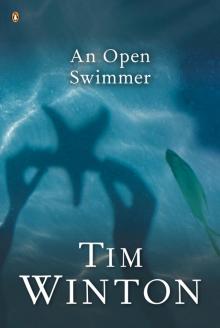 An Open Swimmer
An Open Swimmer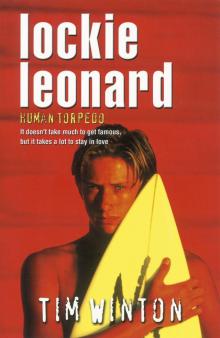 Human Torpedo
Human Torpedo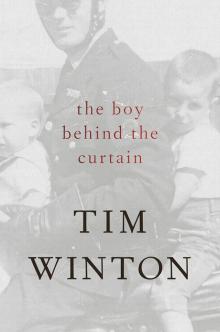 The Boy Behind the Curtain
The Boy Behind the Curtain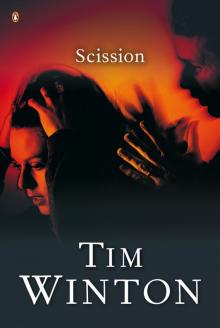 Scission
Scission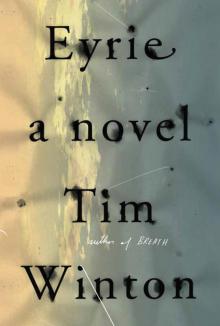 Eyrie
Eyrie Island Home
Island Home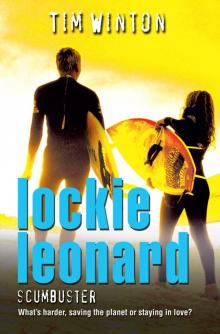 Scumbuster
Scumbuster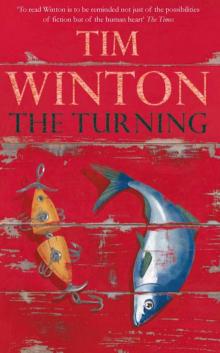 The Turning
The Turning Legend
Legend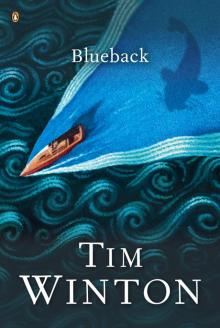 Blueback
Blueback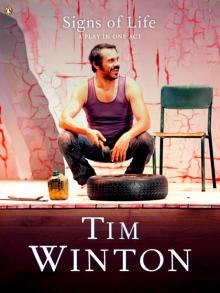 Signs of Life
Signs of Life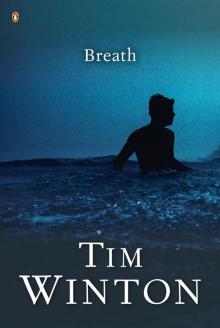 Breath
Breath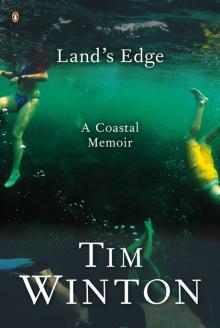 Land's Edge
Land's Edge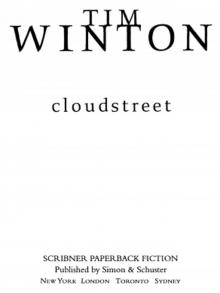 Cloudstreet
Cloudstreet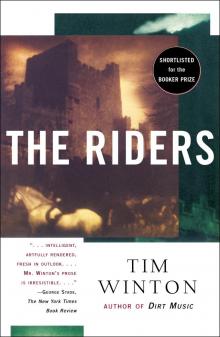 The Riders
The Riders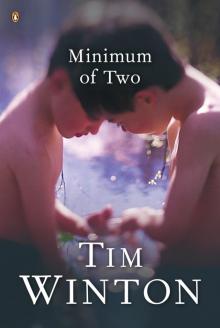 Minimum of Two
Minimum of Two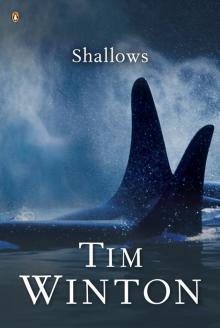 Shallows
Shallows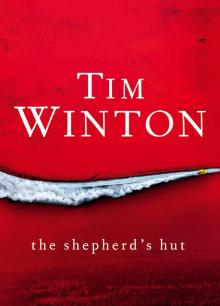 The Shepherd's Hut
The Shepherd's Hut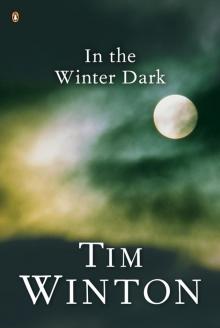 In the Winter Dark
In the Winter Dark